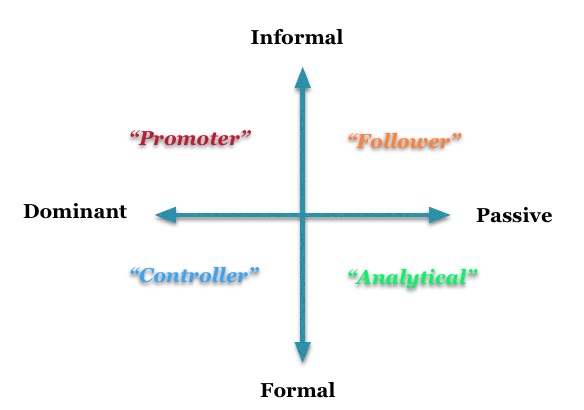Selling Via Personality
How many times have you made the same sales presentation, eliciting what you considered to be the same client responses, only to achieve mixed sales results? More than likely, it was not what you said, but how you presented the information, which made the difference.
If you have arrived at the point in a sales call where you are actually making a full sales presentation, you have captured the client’s attention and, by definition, they are interested. How you present your case, what you emphasize, where you guide the facts, and what kind of closing question that you ask will determine if you land the sale, or not.
 One proven method of determining your direction is by making an assessment of the client’s personality as soon as you possibly can, and that may mean even before you actually meet the client. Everybody has a personality that fits into some form of a measurable scale. People leave a plethora of clues around themselves that can accurately define their personality. By being observant and using all of your senses, you may be able to solidify the sale, even before you extend your initial handshake.
One proven method of determining your direction is by making an assessment of the client’s personality as soon as you possibly can, and that may mean even before you actually meet the client. Everybody has a personality that fits into some form of a measurable scale. People leave a plethora of clues around themselves that can accurately define their personality. By being observant and using all of your senses, you may be able to solidify the sale, even before you extend your initial handshake.
Through determining what personality type your client is, you can tailor your presentation to meet his/her personality needs and appeal to his/her positive nature, directly. The questions are: how do you determine personality types and how do you alter your presentation to fit these types?
First, let’s look at the foundation of personality types. The above scale illustrates two intersecting lines, the first, expressing a range from Formal to Informal and the second from Dominant to Passive. The resulting four quadrants can then be described using the titles of “Controller,” “Promoter,” “Follower,” and “Analytical.”
The Controller
The more formal a person is, who also shows signs of dominance, fits the category of Controller. This person demands order in everything. His workplace is clutter free; nothing on the desk except shine. He will listen intently, ask very probing, but non-committal questions, and will expect a complete and thorough presentation of facts about how your product will benefit him and his company. He will seldom tip his hand as to what he’s thinking. The absolute essential personality trait of the Controller is that he is a decision maker. You must always present more than one option to him or he will stand up and leave without saying goodbye. A successful closing question should always contain some version of, “Which option will serve you best?”
Time is always important to him, so be prepared to waste none. Know your material, present it all, but be succinct and don’t lose sight of his need to make the decision.
The Promoter
Moving clockwise around the quadrant to the Promoter, we find the prevailing personality trait that he possesses is, “How will this make me look good?” Personal jewelry, flashy clothing, expensive art, a high performance automobile are all visible clues around a Promoter. Sales presentations must emphasize how your product/service will make him a leader among his associates. Your product will make the difference in giving him the advantage against his competitors. All analogies must refer to him gaining the winning edge. He will tell you what his passions are; you must show how you can satisfy them.
The Follower
The Follower is both informal and passive. You can spot him by the number of photos surrounding him, the framed awards, mounted fish or other trophies that reflect his association with other people or organizations. All of his degrees and industry citations will be framed and on display. He cares deeply about family and what his peers are doing and will defer to their judgment, rather than decide on his own. What others have done in this situation means everything to him, even more than what he may think that his own needs may be. A strong referral from a respected colleague is golden. Convincing examples of how your product helped similar businesses will help close the Follower.
The Analytical
The final quadrant, the Analytical, is passive and formal. This personality type likes precision and details, and lots of them. He cares about the inner workings of the products, the measurable effects that they produce. He wants to make sure everything is compatible with his systems. He loves to ask question after question, so that you should be prepared with answers. You must procure his required specs, as soon as possible, to control the direction of the presentation. Once you know what he demands, you must zero in on the quantitative and qualitative data about your product, or he will wear you out with questions. Spell out everything that you will deliver to him in writing, including detailed pricing and, then, close.
Having a solid sales presentation, a full command of your product, a keen awareness of surroundings and an open mind along with this basic understanding of these four personality traits will help you become a better salesperson.
Using Personality Based Tactics
An actual example of how using personality traits work might convince some non-believers.
Years ago, I was selling a financial service to members of the Chicago Medical Society. I called on a doctor on North Michigan Avenue, the Magnificent Mile. As I entered his waiting room and asked to see the doctor, I noticed one wall was covered with Annual Awards for Outstanding Accomplishments as a board certified plastic surgeon, all with the doctor’s name on them. I was impressed with his accomplishments, but more so with the fact that he had them on display. Knowing this to be a trait of a “Follower,” I decided upon that approach for the presentation. I had my ‘show and tell’ ready with a stack of agreements from other members of the medical society, who had already purchased my service.
When I was shown into the doctor’s office, I was shocked to find a blind man wearing a doctor’s coat with the doctor’s name embroidered on the chest. There was an assistant present, who acted as the doctor’s eyes. The doctor explained that he had had an accident, lost his eyesight, and had since become a board certified psychiatrist.
What to do? I wasted no time, pulling out all of my show and tell materials, handing them to the assistant, while saying, “As you can see doctor, ….” and I started naming all of the other doctors who had purchased my service. His assistant affirmed what I was saying as I was going along. When I finished the presentation, I reviewed the sales agreement, emphasizing that it was the same agreement that the other doctors had signed and I simply asked, “Does this make sense to you, doctor?” He agreed and I took my pen, put it into his hand and guided it to the sales agreement, which he signed on the dotted line.
The doctor may have lost his eyesight, but he didn’t change his personality. If I hadn’t used this strategy based on personality traits, I probably wouldn’t have gotten the sale. Give it some consideration. It is helpful.








